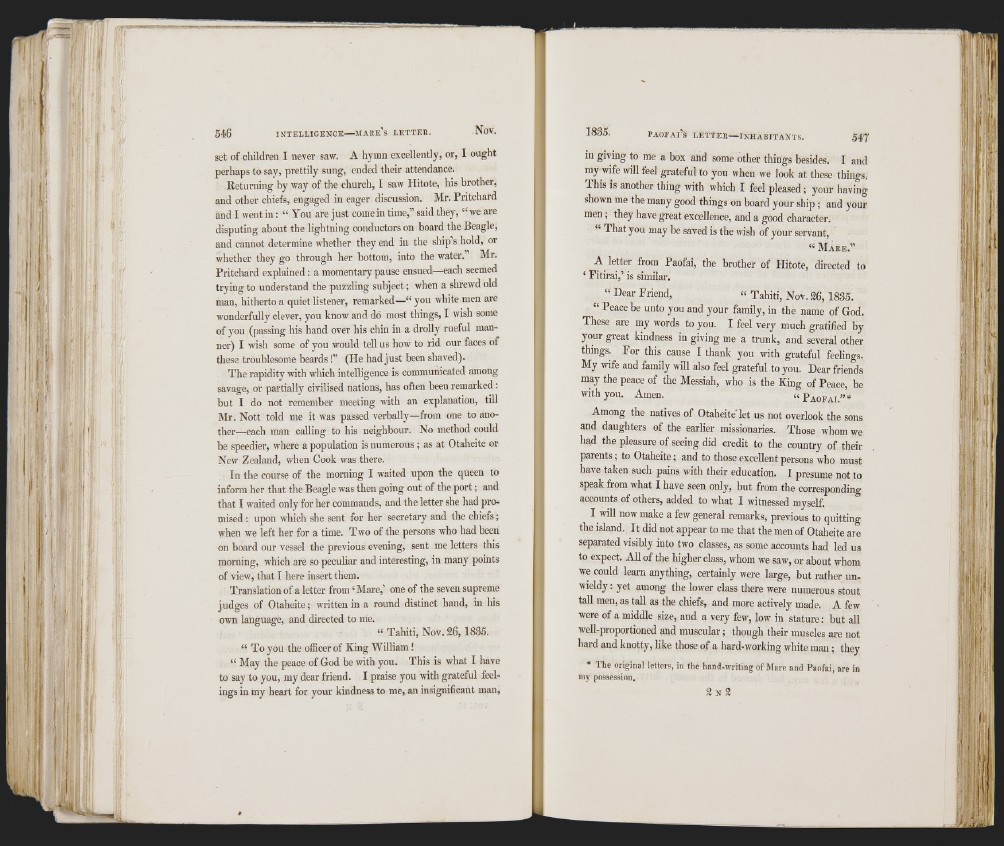
'íl
i
H
546 INTELLIGENCE MARES LETTER.
set of children I never saw. A hymn excellently, or, I ought
perhaps to say, prettily sung, ended their attendance.
Returning by way of the church, I saw Hitóte, his brother,
and other chiefs, engaged in eager discussion. Mr. Pritchard
and I went in : “ You are just come in time,” said they, “ we are
disputing about the lightning conductors on board the Beagle,
and cannot determine whether they end in the ship’s hold, or
whether they go through her bottom, into the water.” Mr.
Pritchard explained: a momentary pause ensued—each seemed
trying to understand the puzzling subject; when a shrewd old
man, hitherto a quiet listener, remarked—“ you white men are
wonderfully clever, you know and do most things, I wish some
of you (passing his hand over his chin in a drolly rueful manner)
I wish some of you would tell us how to rid our faces of
these troublesome beards!” (He had just been shaved).
The rapidity with which intelligence is communicated among
savage, or partially civilised nations, has often been remarked :
but I do not remember meeting with an explanation, till
Mr. Nott told me it was passed verbally—from one to another—
each man calling to his neighbour. No method could
be speedier, where a population is numerous ; as at Otaheite or
New Zealand, when Cook was there.
In the course of the morning I waited upon tbe queen to
inform her that the Beagle was then going out of the port; and
that I waited only for her commands, and the letter she had promised
; upon which she sent for her secretary and the chiefs;
when we left her for a time. Two of the persons who bad been
on board our vessel the previous evening, sent me letters this
morning, which are so peculiar and interesting, in many points
of view, that I here insert them.
Translation of a letter from ‘Mare,’ one of the seven supreme
judges of Otaheite; written in a round distinct hand, in his
own language, and directed to me.
“ Tahiti, Nov. 26, 1835.
“ To you the officer of King William !
“ May the peace of God he with you. This is what I have
to say to you, my dear friend. I praise you with grateful feelings
in my heart for your kindness to me, an insignificant man.
111 giving to me a box and some other things besides. I and
my wife will feel grateful to you when we look at these things.
This is another thing with which I feel pleased; your having
shown me the many good things on board your ship ; and your
men; they have great excellence, and a good character.
“ That you may be saved is the wish of your servant,
“ M a r e . ”
A letter from Paofai, the brother of Hitóte, directed to
‘ Fitirai,’ is similar.
“ Dear Friend, “ Tahiti, Nov. 26, 1835.
“ Peace be unto you and your family, in the name of God.
These are my words to you. I feel very much gratified by
your great kindness in giving me a trunk, and several other
things. For this cause I thank you with grateful feelings.
My wife and family will also feel grateful to you. Dear friends
may the peace of the Messiah, who is the King of Peace, be
with you. Amen. “ P a o f a i .” *
Among the natives of OtaheiteTet us not overlook the sons
and daughters of the earlier missionaries. Those whom we
had the pleasure of seeing did credit to the country of their
parents; to Otaheite; and to those excellent persons who must
have taken such pains with their education. I presume not to
speak from what I have seen only, but from the corresponding
accounts of others, added to what I witnessed myself.
I will now make a few general remarks, previous to quitting
the island. It did not appear to me that the men of Otaheite are
sepai-ated visibly into two classes, as some accounts had led us
to expect. All of the higher class, whom we saw, or about whom
we could learn anything, certainly were lai-ge, but rather unwieldy
: yet among the lower class there were numerous stout
tall men, as tall as the chiefs, and more actively made. A few
were of a middle size, and a very few, low in stature: but all
well-proportioned and muscular; though their muscles are not
hard and knotty, like those of a hard-working white man; they
* The original ietters, in the hand-writing of Mare and Paofai, are in
my possession.
2 N 2